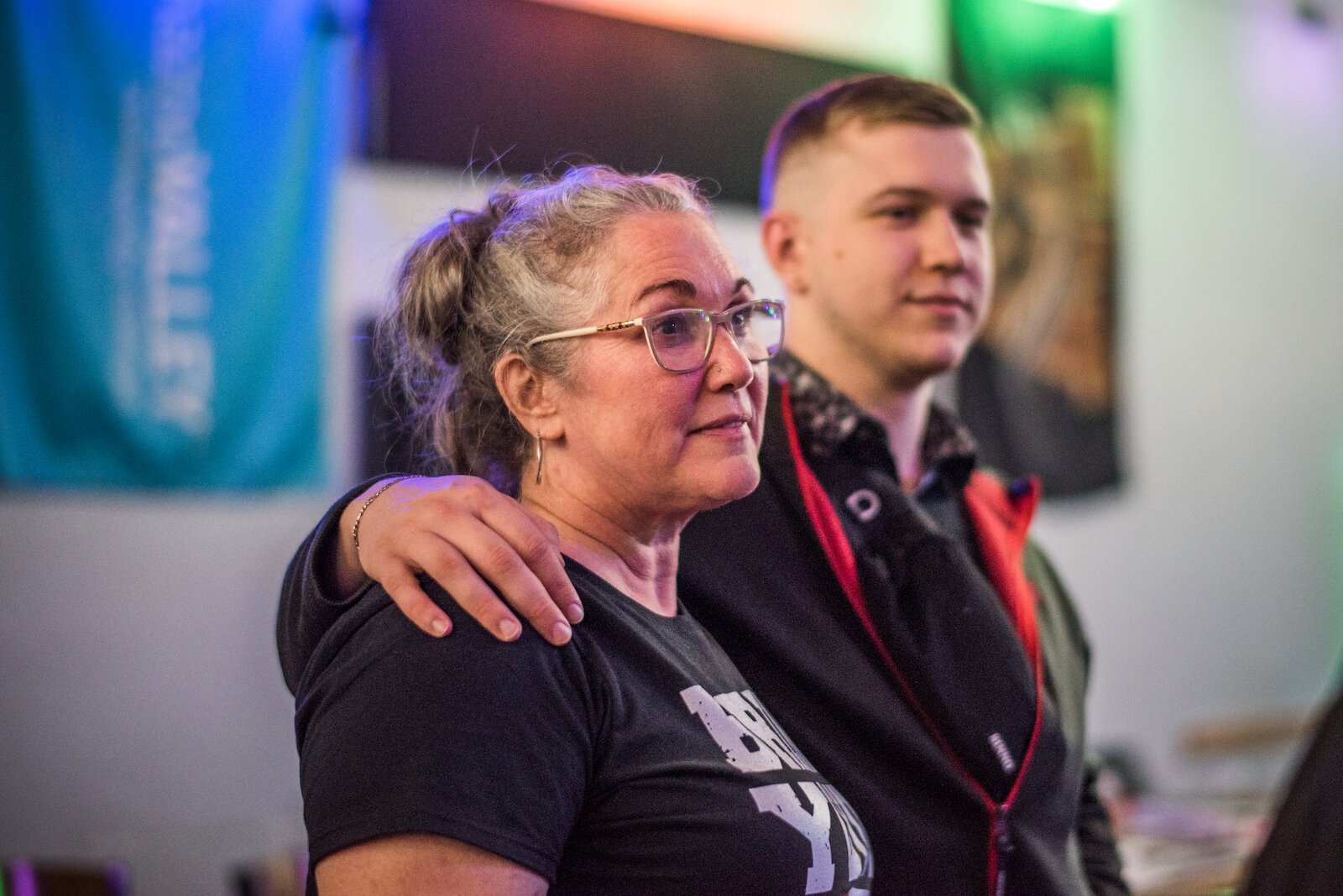Editor’s note: This story is part of Southwest Michigan Second Wave’s On the Ground Kalamazoo series.
Channon Mondoux, born and raised in Windsor, now living in Portage, has long had a dream.
“I always wanted to have a big party, and invite Canadians to it,” she says.
We may sometimes be as different as Johnny Cash and Stompin’ Tom Connors, or BBQ potato chips and all-dressed chips. But Americans and Canadians, Michiganders and Ontarians, all enjoy the same things: “A good time, music, beer, food.”
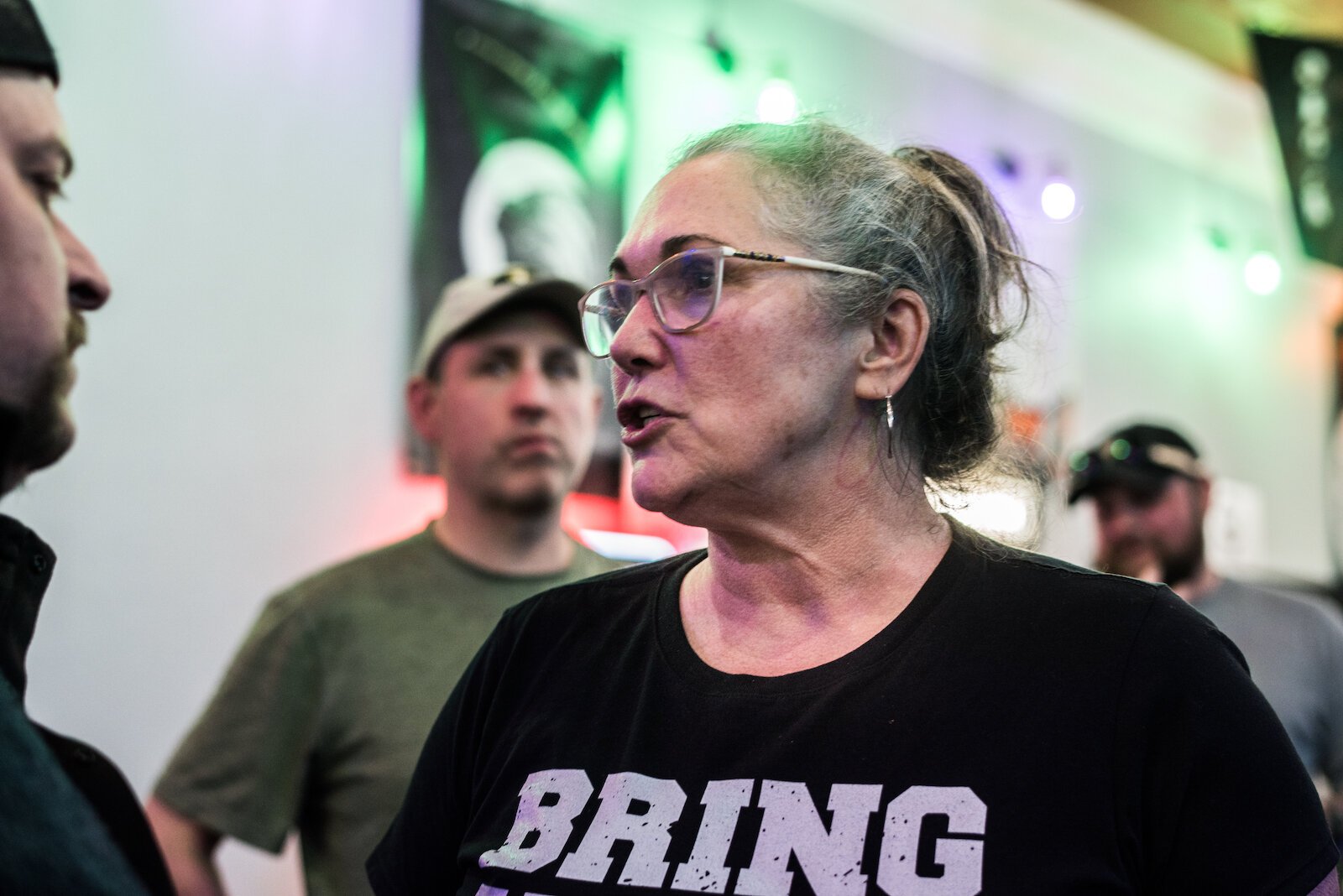
This year she’s bringing her maple leaf dreams to life, with the Canadiana Fest, happening Oct. 7 at Arcadia Creek Festival Site. She has also just formed the Canuck Club, a monthly meeting of transplanted Canadians and Americans who are “Canadienvious.”
Canadienvious
Mondoux held a meeting that was part festival planning, part Canuck Club, on April 27 at Final Gravity in Kalamazoo.
It was the first for the club, so only two born-Canadians were there, Mondoux and her son Ben — Mondoux hopes for more once the word gets out. (Later she realized there were two others, Chef Brian Hay and Jodi Michaels, both on the fest team, so make that four born-Canucks.)
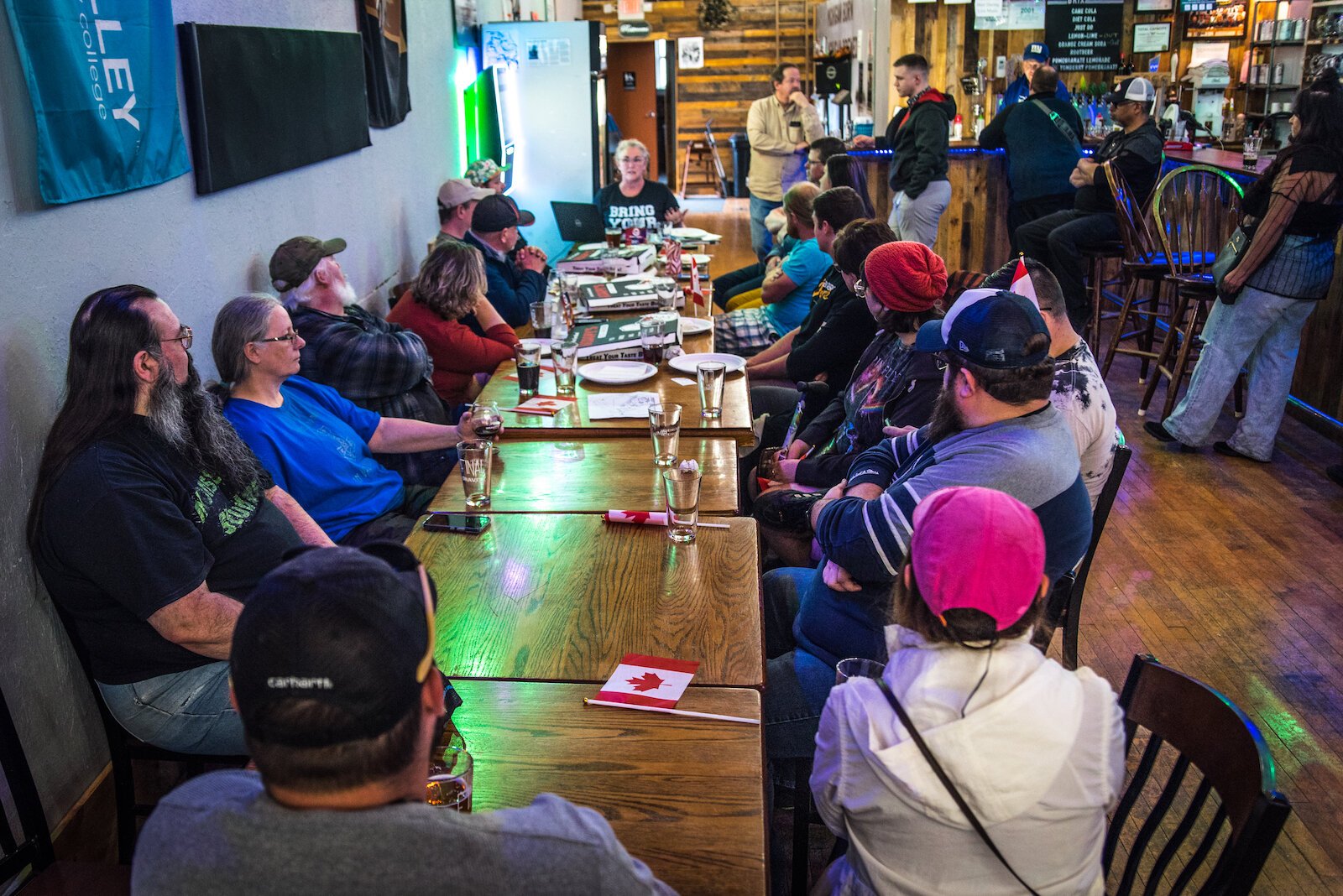
But around 30 Canadienvious Kalamazooans showed up, to drink beer, share moose stories, and talk about their love for puck-based ice sports.
“Canadienvious, it’s one word, and it’s going to attract all the people who don’t know that they love Canada, too,” Jason Hall, co-founder of the Kalamazoo Curling Club, says.
Hall lives in Kalamazoo but grew up in Ann Arbor, where he could listen to CKLW out of Windsor and watch curling on Canadian TV. Around age 10 he spent his time listening to Bob and Doug McKenzie’s 1981 album, “Great White North”, the record that introduced Americans to the Canadiana of beer, smokes, toques, and back bacon.
“I’ve curled in Canada,” Hall says. He’s pushed the stones on genuine Canuck ice from Windsor to the Bon Soo winter carnival of Sault Ste. Marie, Ont.
“I’ve got a picture of me and Mr. Bon Soo,” he says, scrolling through photos on his phone. He lands on “me with world champion curler Debbie McCormick… There’s John Landsteiner, he’s the US Gold Medalist….. and there’s Mr. Bon Soo, he’s a human snowball!” Mr. Soo is the festival mascot.
Alike, but different
Mondoux moved to Kalamazoo from Windsor 20 years ago, and became a local chef and writer. (She has written about food for Second Wave).
She’s had some time to think about her two countries.
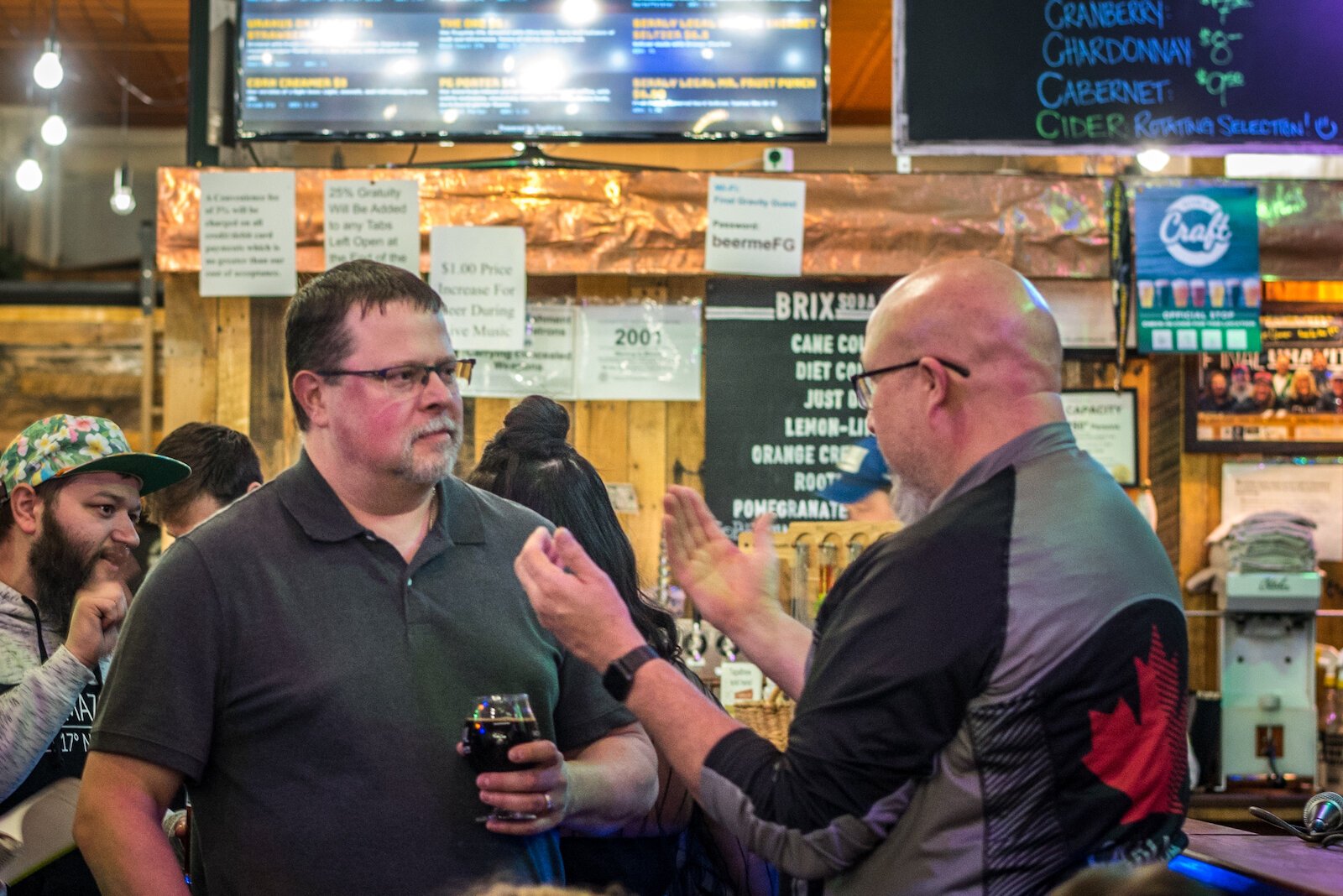
Like Kentucky bourbon and Canadian blended whiskey, peameal bacon and Canadian bacon — which is not really Canadian, and is an “abomination,” Mondoux says — we are alike, but different.
Speaking of Canadian whiskey, Mondoux points out Crown Royal’s Super Bowl LVII commercial, with Dave Grohl (not Canadian) thanking Canada for peanut butter, basketball, the battery, and other innovations from up north.
The ad is a sign that “Canada is really coming into its own,” she says.
Still, we here in the States might not really get what Canada is about, what makes it a distinct, sovereign nation.
When she was earning her undergrad at the University of Windsor, Mondoux says, a social sciences professor taught about the root difference between the two countries.
“In the United States, when the country was being settled, people went out west… And the law came afterward. So you had the Wild West, you had the Gold Rush, you had all that crazy absolute lawlessness, which was kind of foundational for the United States,” she says.
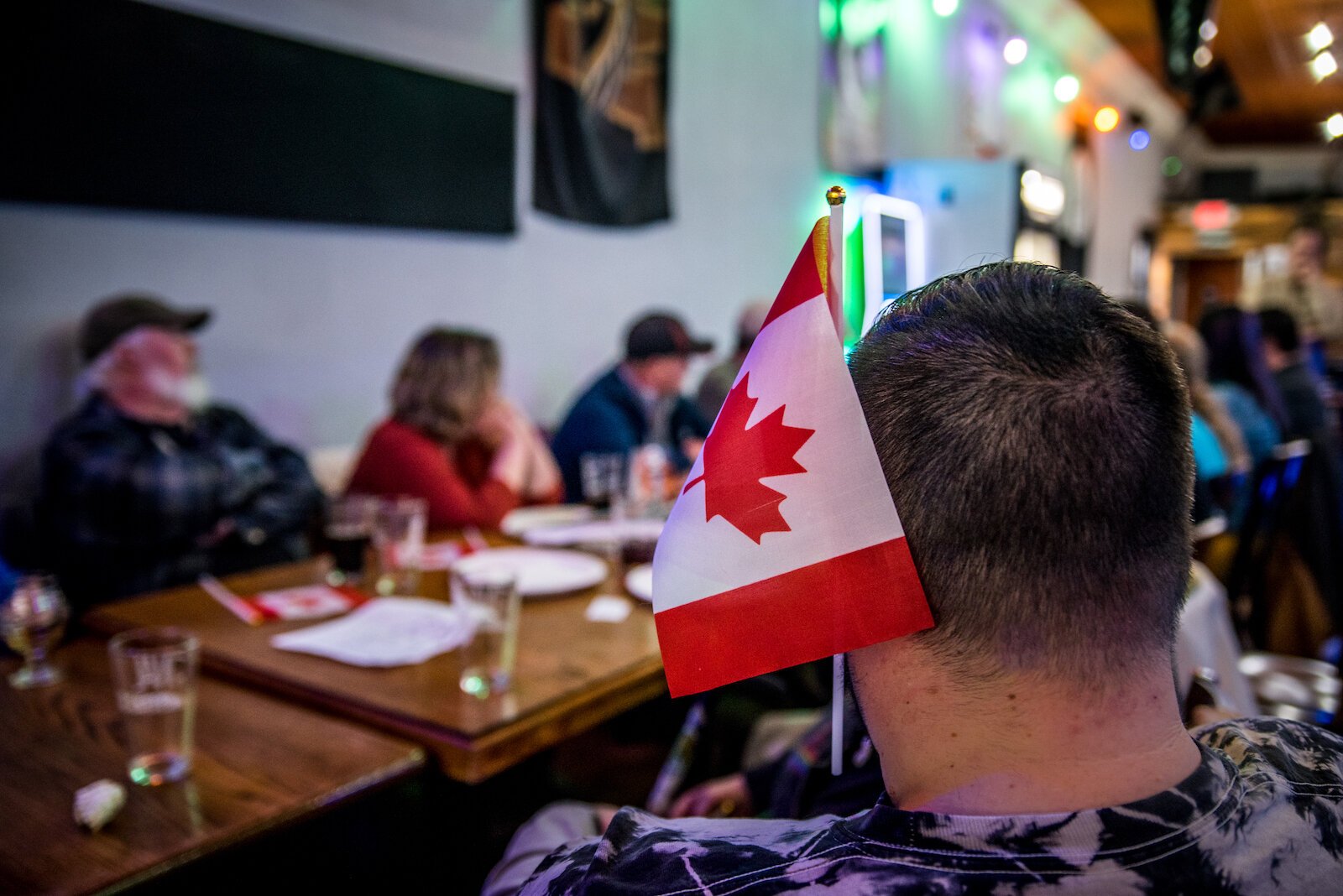
“In Canada, the Mounties went west, and the people came after them. They (Mounties) established the forts, they established relationships with — which weren’t always great — with the First Nations people. Let’s be honest now. It wasn’t always tea and crumpets.”
Mondoux comes from a French-Indian family. “They had to shed that (their ethnic identities) back in the ’20s. They left the reserve and came onto the mainland, they had to shed their identity,” she says. “If you had a French accent, you had a hard time getting a job in English-speaking Canada.”
“There are some not-ideal things in the way things went down,” in Canada’s history. “That has changed because people stood up and fought for their rights.”
Now, Canada is a “mosaic” of cultures, a national way of looking at its many peoples as belonging to individual cultures, but are still all Canadian. Compare that with America’s old “melting pot” concept, where cultures were expected to assimilate.
“Canada is a mosaic country. Their immigration policy since Trudeau’s time, the first Trudeau, in the 1970s, has been not a melting pot, it’s been to be multicultural. That means that they want you to retain your identity, but become a Canadian and contribute to your identity. We believe we’re stronger as a nation with people who are accepted for who they are.”
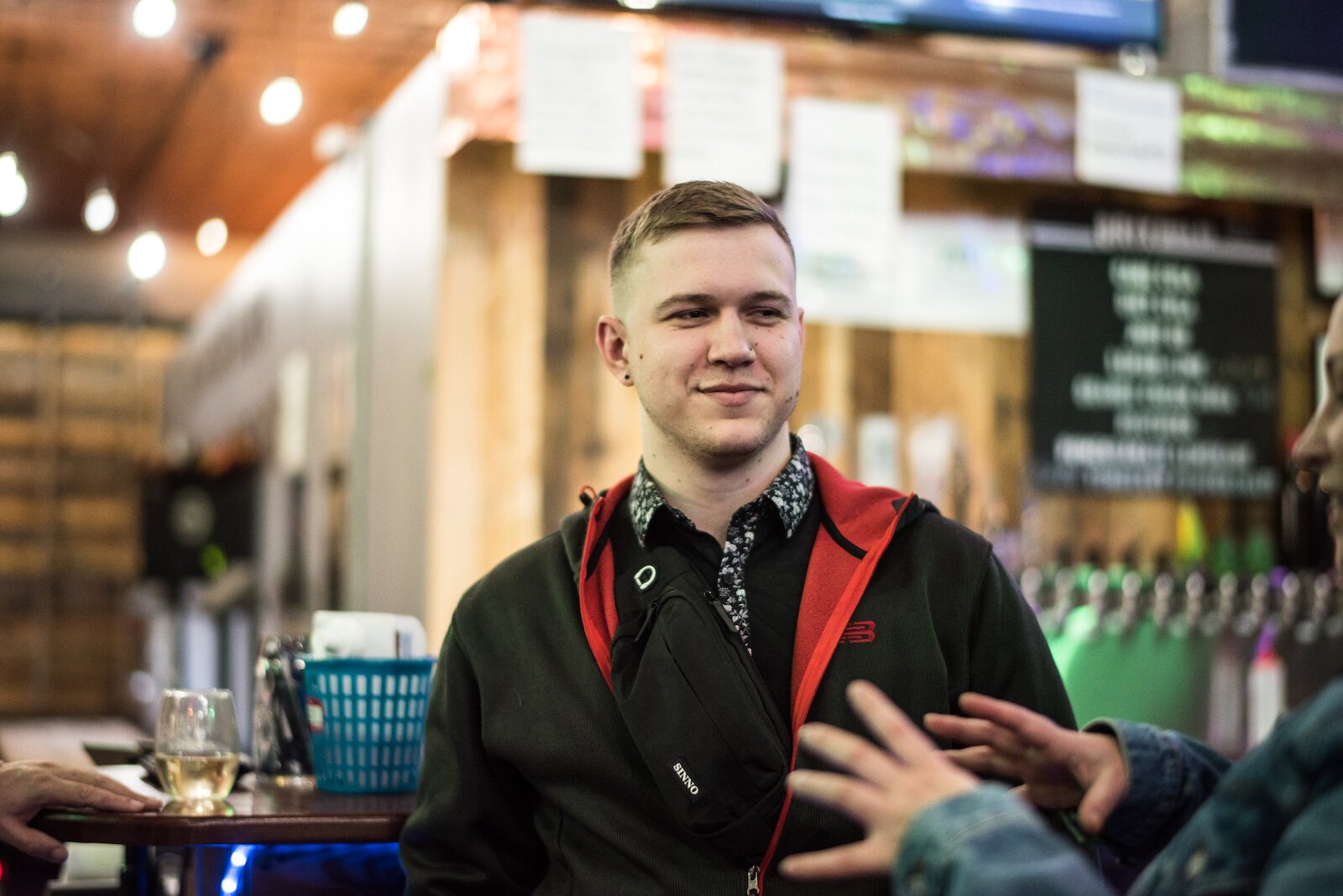
Then there’s healthcare. In Canada, it’s one of their foundational rights, she says, “the right to medical care.”
“Is it ideal in Canada? No,” she says. There are complaints about the public health care system there, but she thinks of her father. “He didn’t go bankrupt because he had to have surgery for this, that, or the other. If you have cancer, they’re not going to fire you from your job and you can’t get healthcare afterward.”
Does the difference go back to our relationships with the Royal Family? We were the rebellious kid who punched Dad (George III) in the face and stormed out at 16. Canada grew up a bit until an amicable parting with Mom (Queen Victoria) and a continued close relationship with the Crown.
“A little bit. We kinda did, yeah,” she says. “I’m not saying either one was better than the other, but just the philosophy and the culture is a little bit different.”
Canadian history shows “our respect for authority — and people believe that respect for authority means you’re brainwashed or you’re a sucker — the fact of the matter is that a certain amount of civility is needed in the world,” Mondoux says.
“We have lost all civility right now in the United States. Everyone is fair game…. the first thing out of your mouth, people are just ready to hang you for it. There’s really no benefit of the doubt, there is no deep discourse. And that’s really sad because the tribalism has become so damaging. Regardless of what side of the fence you live on, you’re losing so much.”
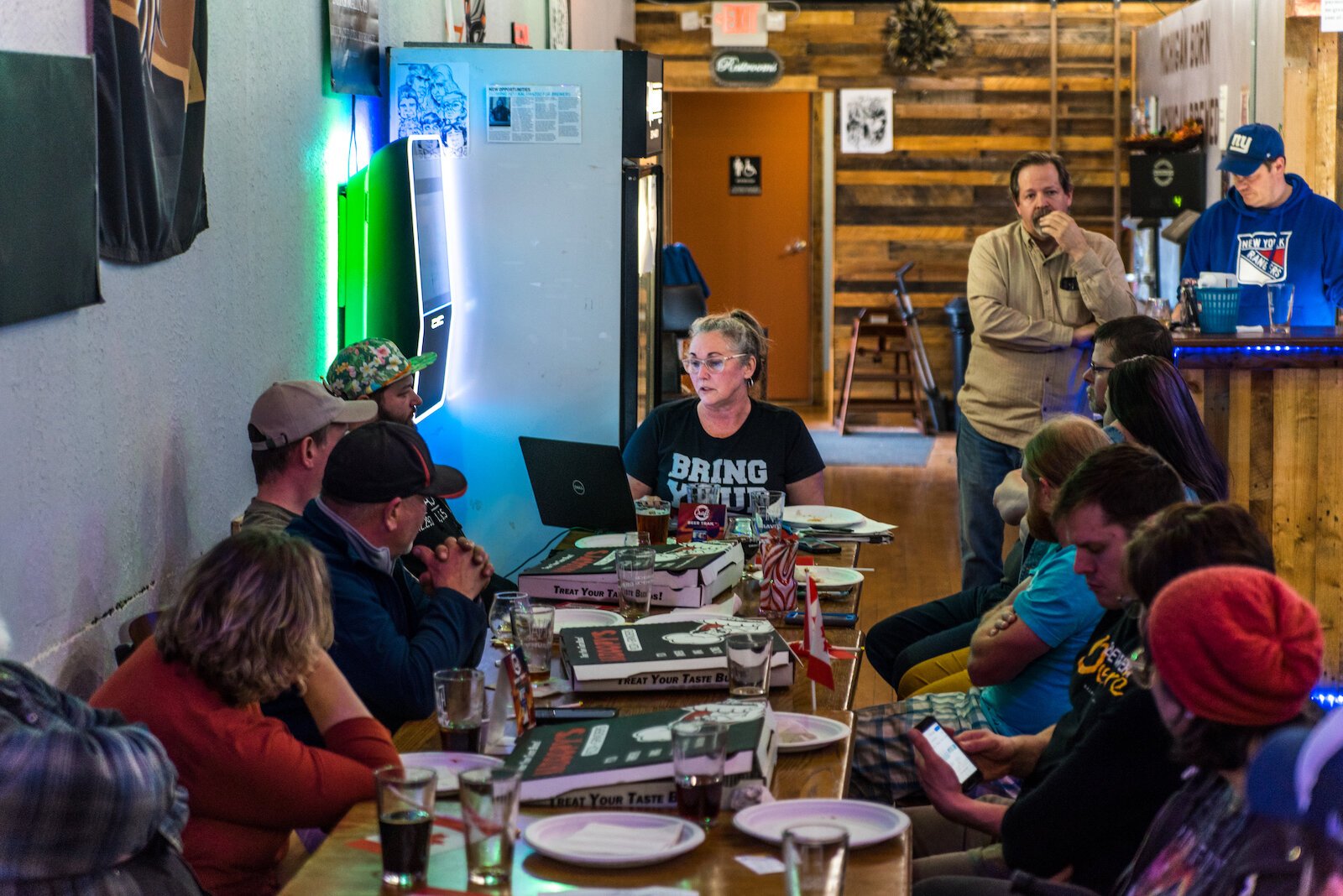
She’s afraid that “a little bit of that” is getting into Canada. A prime example was the “Freedom Convoy,” truckers protesting COVID-19 measures in early 2022.
But what about the most-common stereotype, that Canadians are so polite?
“Well, we are until we’re not. One of the most feared forces in World War II were the Canadians. If you look into what the Nazi officers said about who they would rather face, they did not want to come face-to-face with the Canadians. Actually, they (Canadians) were charged with the greatest number of war crimes against German soldiers,” she says.
“I’m not proud of that. It’s something that happened. They went in and said, we’re going to do everything we can. It’s kind of the mentality of Canadians, I think.”
Canadians are fighters who don’t shy from a good ol’ “donnybrook” in the parlance of the Canadian sitcom “Letterkenny.”
They’ve struggled for what they’ve got. Mondoux points to her family’s history of living in small towns around Windsor. She graduated with a university degree, but both parents never went to high school. “We come from very humble means, we worked hard for everything we got. I’ve just always felt if you want something and you want your world to be better you have to be an active part of that.”
Then, there is the camaraderie between the nations. “We are also the ones who stand arm-in-arm and say, what can we do to the world, what can we do to help you? America and Canada have had a relationship for hundreds of years, we are best friends,” she says.
“We have a common goal of being able to live happy and free. And I think it’s like your little brother has grown up, and suddenly you look at your little brother and go, ‘Holy crap! They’re amazing. They really did it right! They figured out some stuff that we didn’t figure out.'”
Moose bearing poutine
The idea for the festival, Mondoux says, “comes from a very genuine place for me — I realized that the things that I love about Canada are the things that everybody here would love, too. And why wouldn’t I want to share that culture with our community?”
“Michigan is very imbued with Canada,” she adds, then pronounces “Detroit” and “Portage” in the original French.
Those French-Canadian fur traders got around in their canoes, didn’t they? “Yup. They got here.”
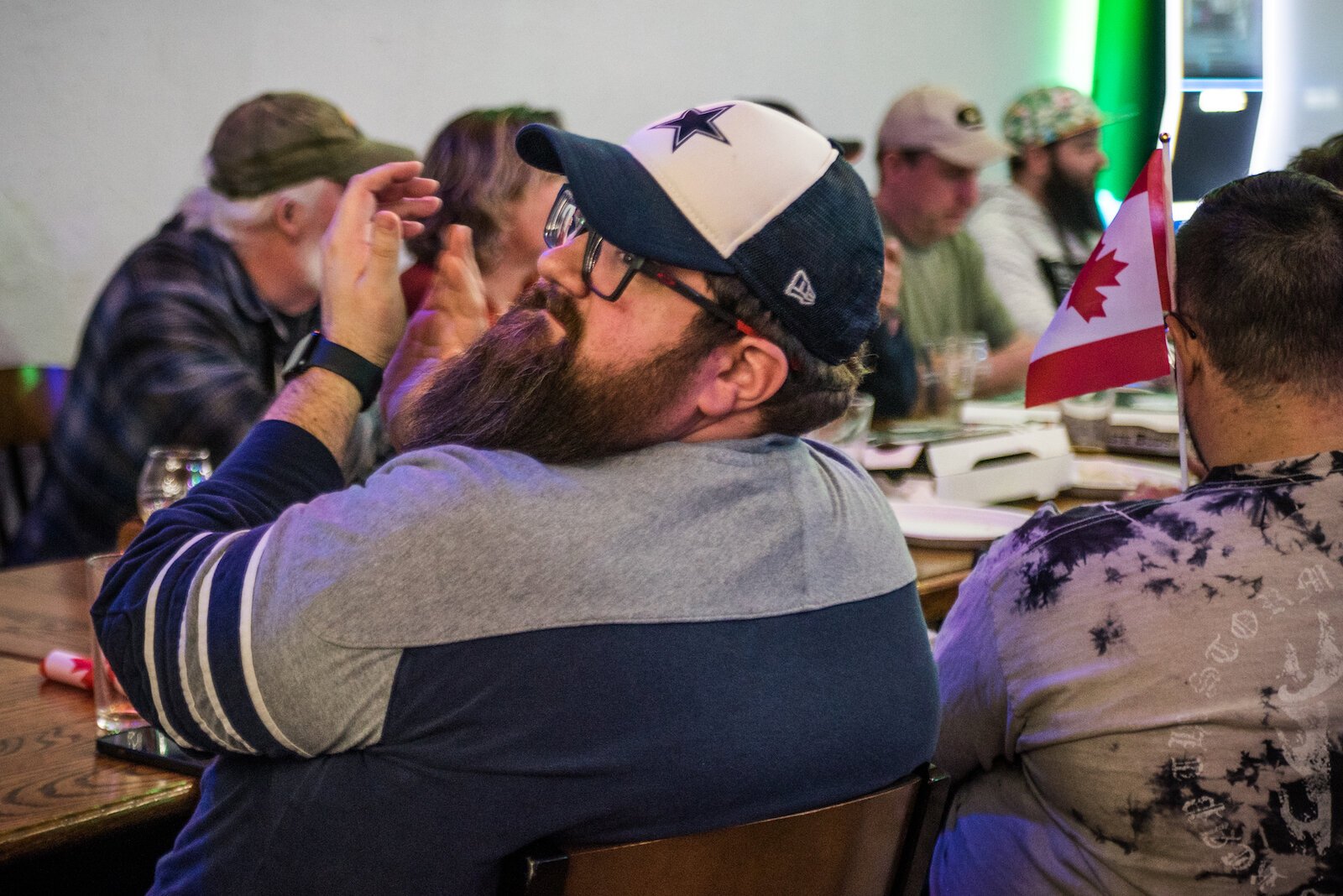
We both love the Great Lakes. We love the nature around the Great Lakes. We love french fries with gravy and cheese curds — though that’s relatively new here, Mondoux says there are several restaurants from Indiana to northern Michigan planning to enter the festival’s poutine contest.
We love music. We know Rush, Celine Dion, Gordon Lightfoot*. But not many here know about that one guy, can’t remember his name, that Canadian folk-singing guy, kinda country, but really Canadian….?
Just a few hints and she knew who I was thinking of. “Stopmin’ Tom Connors? Oh my god, what a hoot!” Mondoux exclaims. “What a character!”
Connors died in 2013, but she hopes to get his son, Taw Connors to the fest. Confirmed are local Celtic band The Hen Pecked Dawgs, who are busy learning Canadian sea shanties; Juno award-winning Canadian jazz musician and Western Michigan University jazz professor, Andrew Rathbun; plus bands Tom Sawyer, a Tribute to Rush, and GLT, Gordon Lightfoot Tribute*.
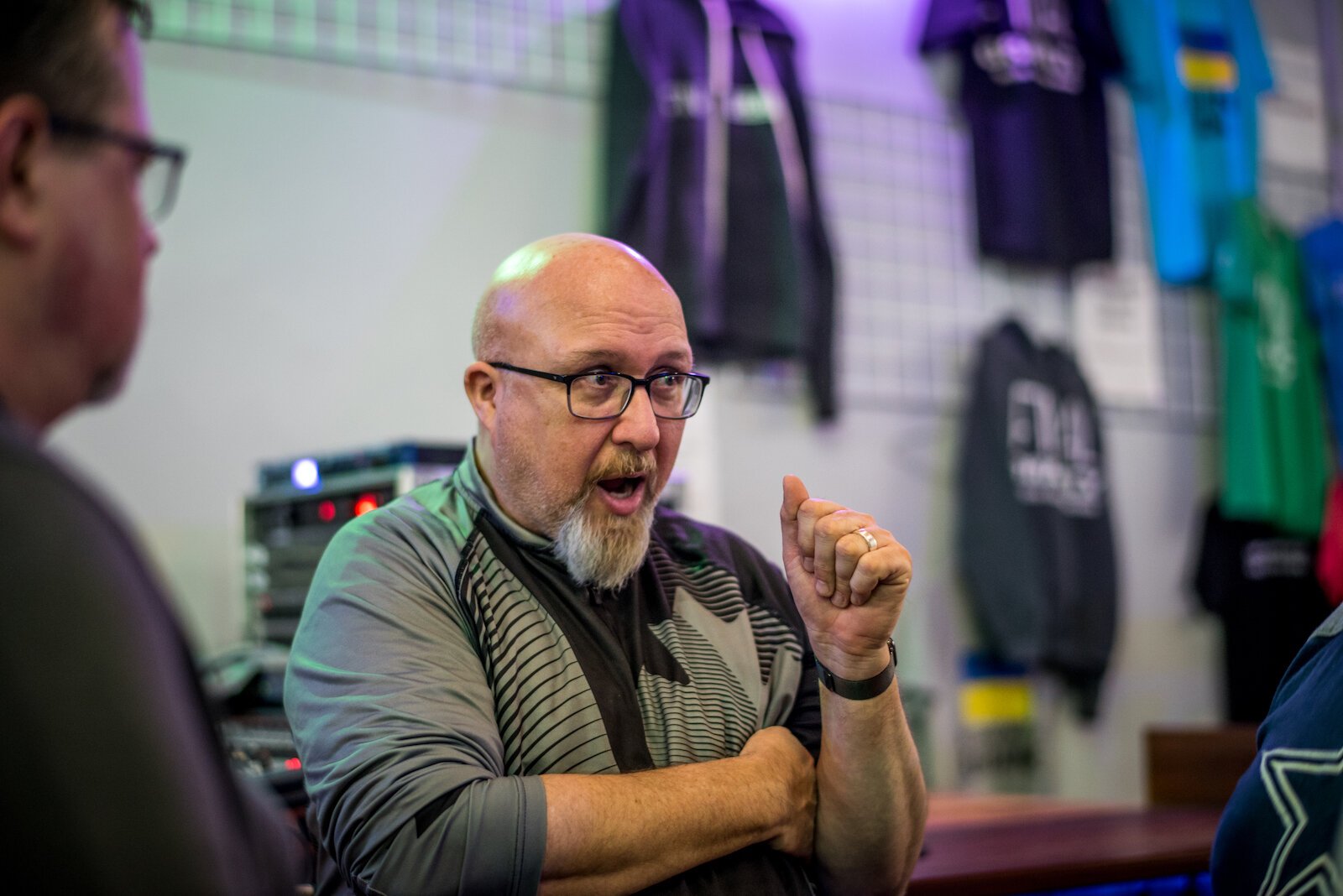
Also confirmed is that Kalamazoo Curling Club is working to get actual curling to happen at the fest, with a synthetic surface instead of ice, Hall says. But the full festival events are TBD.
Anthony Guimond, second-generation French-Canadian and co-owner of Kalamazoo Sportswear, huddled with Hall (also a former Sportswear t-shirt printer) and Mondoux, to discuss what should go on the official fest shirt.
Maybe a “Poutine Guy” mascot? Or a beaver? Or moose?
“A moose-bearing poutine,” Hall says.
The conversation then turns to moose encounters. Guimond recounted an unpleasant incident between a moose and a vehicle in the Upper Peninsula, where the vehicle looked like it had hit a brick wall, the moose’s fate undetermined.
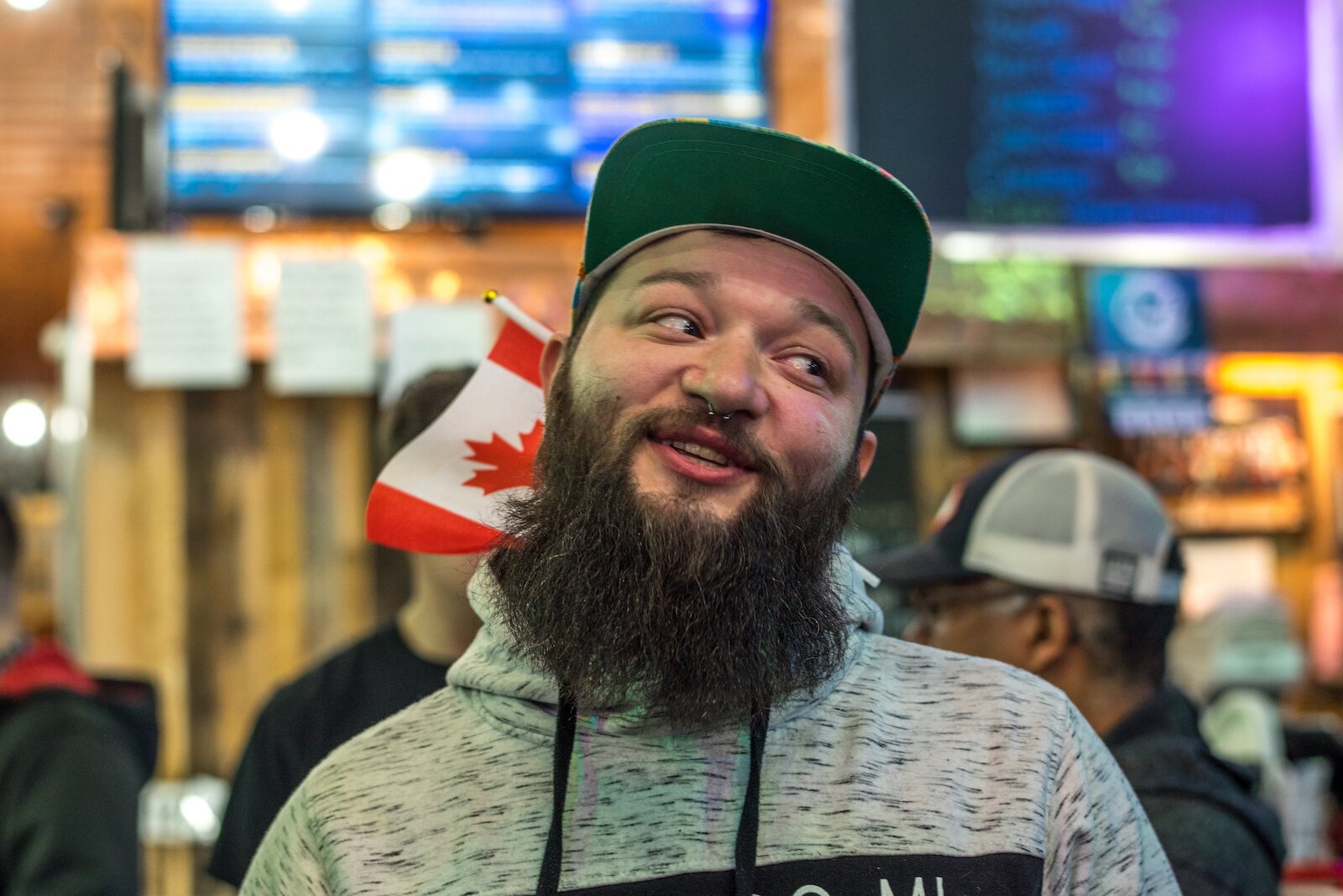
Mondoux had her story of her dad “taking these two guys from Chrysler’s — he worked at Chrysler — up north to go hunting.” The two had never been up north into the deep woods of Ontario. Her dad had fallen asleep in the back of the truck. “He wakes to the sound of the horn. Honk, hooonk! Honk, honk, hoooonnk!”
He sees through the window that the truck was blocked by a bull moose in the road. “These ding-dongs who don’t have a clue are honking the horn at this moose, that’s basically ready to charge.”
Dad banged on the window, and yelled, “‘TURN AROUND! GET OUT OF HERE!’ They’re like, ‘What, it’s a cow.'” The moose was facing the truck “like it’s a challenge, like it’s another bull…..” Long story short, they survived.
The beer and moose tales flowed as hockey played on Final Gravity’s big screen, and for a moment it was as if we were in a pub in one of those little Ontario towns named after an old British village.
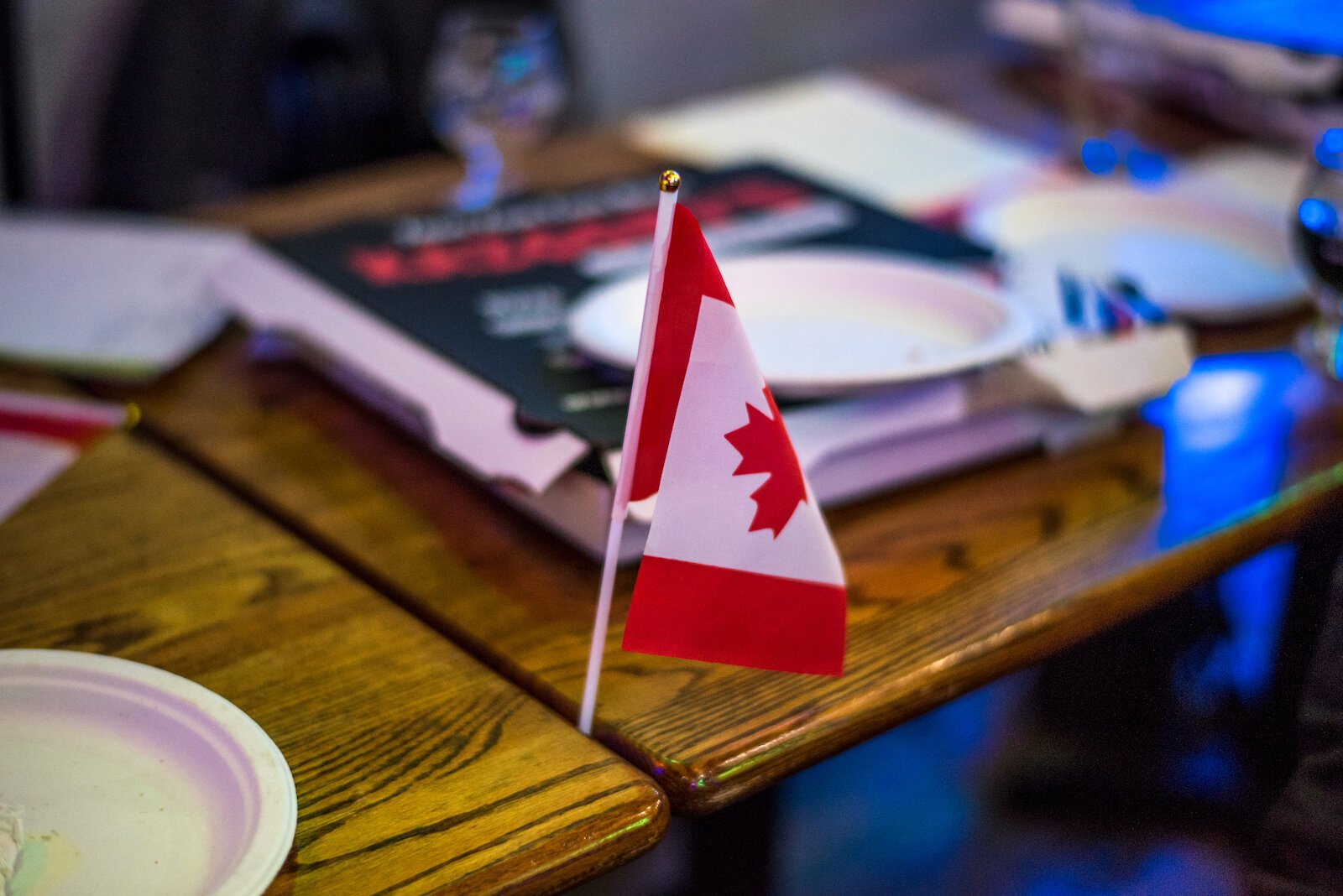
*As we were getting ready for publication, Gordon LIghtfoot died Monday in his home in Toronto.
Channon Mondoux writes, “He was a part of my world as long as I can remember. It’s like I lost an uncle who I didn’t see often but can remember every word of the songs he sang around the campfire.”
“He created iconic Canadian folk music, he was our poet laureate, who sang with his heart and the heart of the Canadian people responded. We loved him, honor him, and hope to celebrate his life and music at the festival.”


